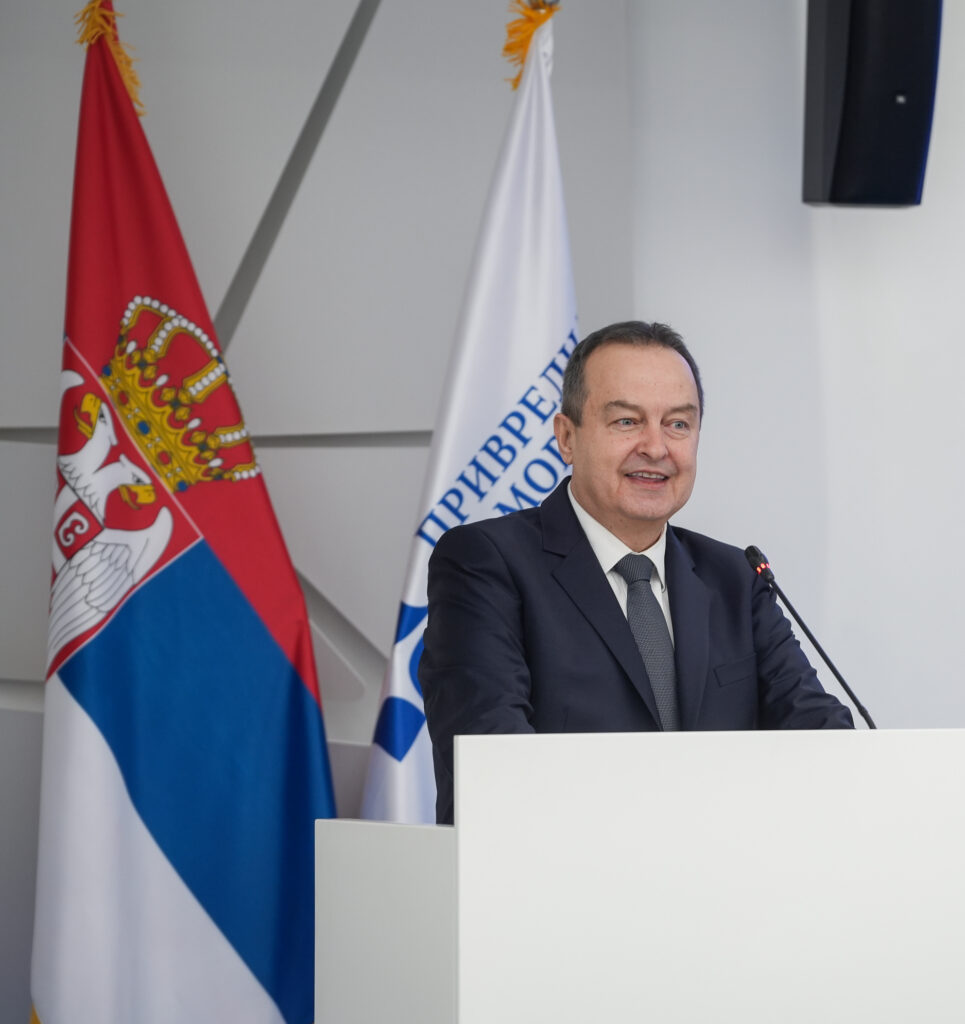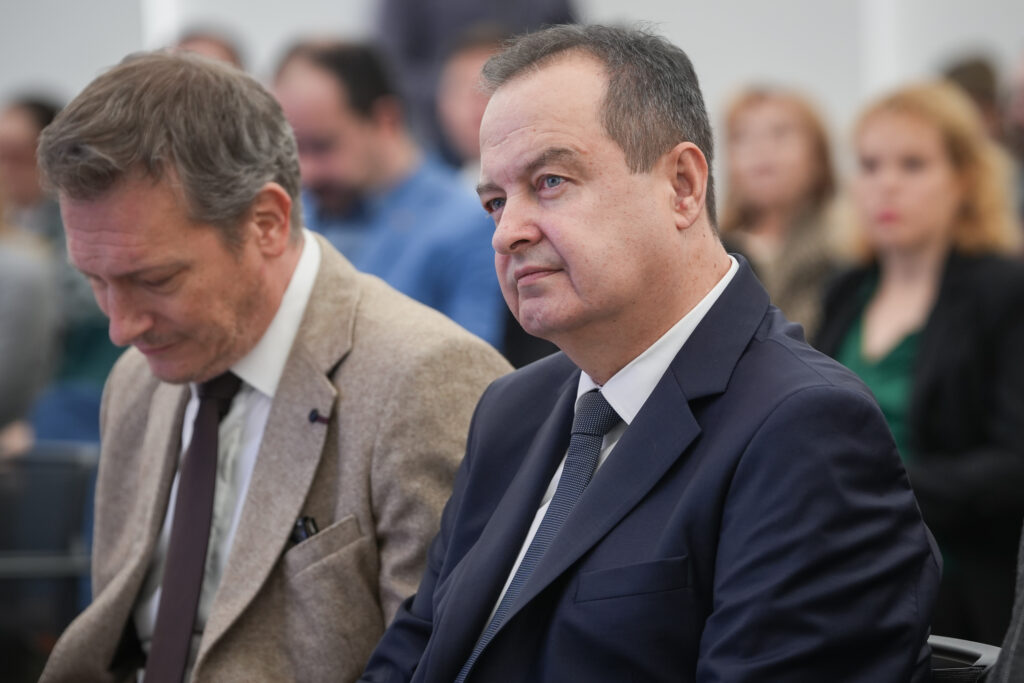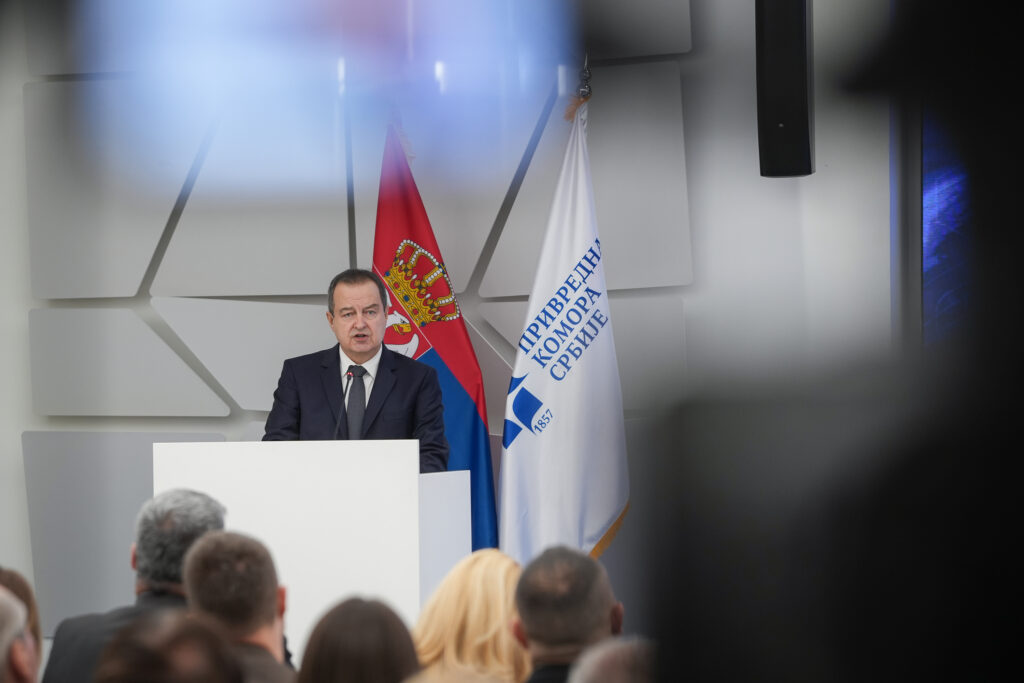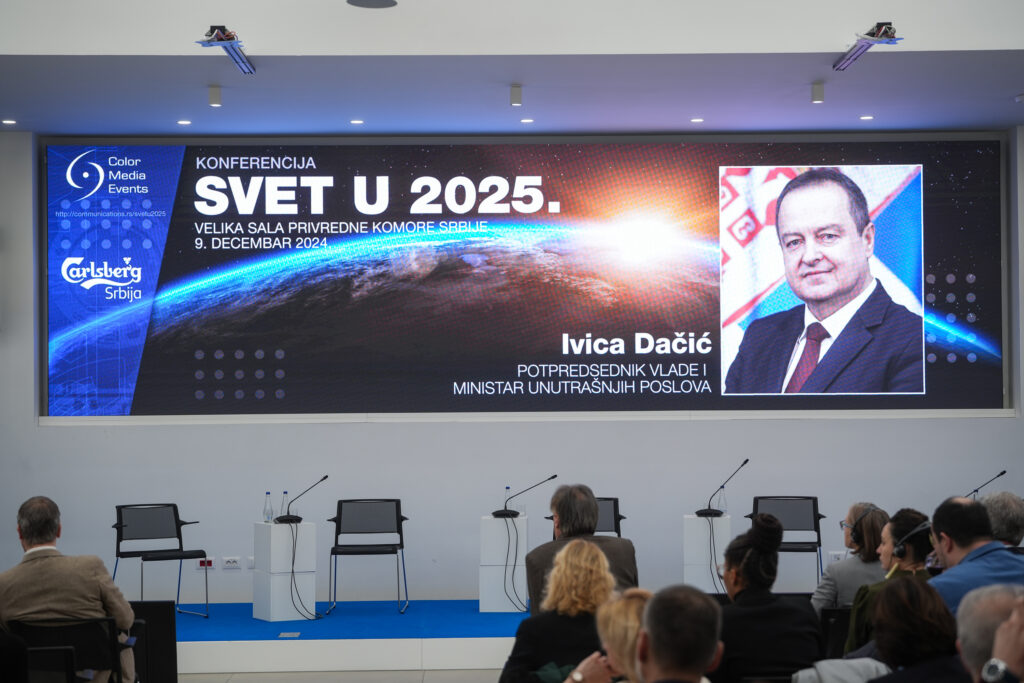Insights from Ivica Dačić at the World in 2025 Conference
 The Great Hall of the Serbian Chamber of Commerce and Industry in Belgrade set the stage for an extraordinary event on 9 December 2024: the World in 2025 Conference, organised by Color Media Events, a part of the esteemed Color Press Group. The conference brought together thought leaders, policymakers, and innovators to reflect on the challenges and opportunities awaiting Serbia and the global community in the near future.
The Great Hall of the Serbian Chamber of Commerce and Industry in Belgrade set the stage for an extraordinary event on 9 December 2024: the World in 2025 Conference, organised by Color Media Events, a part of the esteemed Color Press Group. The conference brought together thought leaders, policymakers, and innovators to reflect on the challenges and opportunities awaiting Serbia and the global community in the near future.
Amidst an atmosphere of anticipation and intellectual exchange, Ivica Dačić, Serbia’s Deputy Prime Minister and Minister of Interior, delivered a keynote address that resonated deeply with the audience. Tackling subjects ranging from global crises to the role of technology and Serbia’s aspirations for 2025, Dačić set a compelling vision for the country’s future. His insights into security, crisis management, and the evolving global landscape provided a roadmap for navigating an unpredictable yet opportunity-filled world.
This gathering of minds and ideas underscored Serbia’s commitment to actively shaping its future and contributing to global solutions, offering a fascinating glimpse into what lies ahead.
Serbia in 2025 – Challenges and Opportunities According to Ivica Dačić
During his address at a significant gathering, Ivica Dačić, Deputy Prime Minister and Minister of Interior presented a comprehensive analysis of global and domestic challenges, reflecting on the upcoming period leading up to 2025. He began his speech by emphasising the unpredictability of the future.
“It is entirely ungrateful to discuss what might be expected in 2025, as it is an equation with many unknowns. Anyone claiming to know exactly what will happen cannot be speaking the truth. I believe even many leaders of the world’s largest countries are unsure,” Dačić stated, setting the tone for his remarks.
Dačić expressed his honour at having the opportunity to speak at such an important event while highlighting Serbia’s place in global affairs. “The world’s future would not interest me as much if Serbia were not a part of it. We stand at an important crossroads, not only as a nation grappling with numerous challenges but also as a country with a clear vision of a better and safer future. The undeniable fact is that Serbia is on the right path and ready to harness all its potential to build a better future for all its citizens,” he emphasised.
The world in 2025 will be challenging but full of new opportunities. Serbia has a clear vision for its future and the strength to build a secure, stable, and just society ready for what lies ahead
Security as the Foundation of Stability
One of the central themes of Dačić’s speech was security, which he described as the fundamental pillar of stability and peace. “The modern world is subject to constant changes, but security remains the foundation upon which stability and peace are built. It is the basis for progress in all other areas—economy, healthcare, and every other aspect vital to the well-being of citizens,” he emphasised.
According to Dačić, increasing global crises demands an integrated approach. He highlighted challenges such as climate change, migration, cyberattacks, terrorism, and crime that exploit modern technologies.
“As security is my responsibility, think of the films where artificial intelligence turns against humans and kills them. Is anyone thinking about that? I’m telling you, we are not even aware of what will become a part of our daily lives in 20 years and in which areas security might be threatened,” Dačić warned.
He stressed that Serbia must not only remain geographically connected with its surroundings but must actively work on building and strengthening new and existing international relationships of cooperation and security. “I am confident that Serbia will continue to strengthen its position in 2025, not only within the region but also globally,” he concluded.
 Modern Challenges in Security
Modern Challenges in Security
Discussing the challenges posed by modern technologies, Dačić highlighted how traditional forms of crime increasingly merge with new digital threats, necessitating innovative solutions and approaches. “The Ministry of Interior is already at a high level of readiness to tackle the most complex security challenges. Whether it concerns cyber threats, organised crime, or other forms of violent extremism, we are not only capable of responding to any threat. Still, we are also continuously strengthening our capacities in terms of personnel and technology,” he stated.
He added that the Ministry invests in new resources to face future challenges more effectively. “We are ready to confront the toughest challenges, fully aware that the future will not be easier and that the challenges will grow. However, we also know we have the capacity, strength, and commitment to build a secure society that will allow all of us to progress,” the minister concluded.
 Crisis Management as an Imperative
Crisis Management as an Imperative
Dačić shed light on the broader perspective of the global situation, reflecting on the continuous crises that, as he stated, have become a constant. “For decades now, gatherings like this have been held worldwide to contemplate the future. If someone were to review the conclusions of these meetings, they would see that not much has changed. Back then, as now, it was acknowledged that the world faces significant challenges. Our primary responsibility is to learn how to manage crises, not to fear them,” he said.
He shared a personal example from 2015, when, as Minister of Foreign Affairs, he chaired the OSCE. “The Ministry’s staff prepared Tito’s speech from 1975 when the OSCE was established in Helsinki. I could have delivered that speech with minor adjustments; no one would have noticed the difference. The crisis is a constant, but the key is knowing how to manage it,” he emphasised.
The crisis is a constant, but knowing how to manage it is key. Our responsibility is to learn and adapt, not to fear the unknown
A Vision for the Future
In closing, Dačić expressed optimism about Serbia’s future. “The world in 2025 will be challenging but full of new opportunities. Increasing efforts will be made to ensure the stability, safety, and security of all segments of society. The Republic of Serbia is aware of its strengths, demonstrates its capabilities, and has a clear vision for its future. I am confident that Serbia will be a country capable of creating a secure, stable, and just society, ready to face all future challenges and seize every opportunity they present,” he stated.
Concluding his address, Dačić added: “Serbia will not be a country that merely waits for change but will actively work to become part of the solution to global challenges. I believe that in 2025, we will be proud of our progress, citizens, and achievements. Serbia is a country that looks to the future with pride, optimism, and confidence.”
